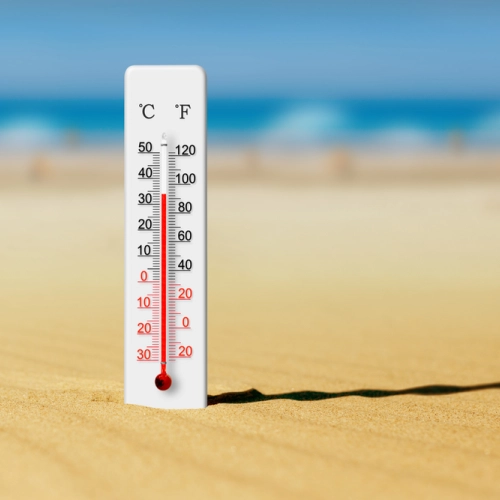
Climate change is a phenomenon that is not only changing the world we live in, but also poses challenges and opportunities for our generation.
In this article, we're going to break it down to better understand it, analyze its causes and effects, and discuss what we can do about it.
Definition: What is climate change?
When we talk about climate change, we are referring to significant alterations in the Earth's average climate conditions over long periods of time. This includes changes in:
- The average temperature , both in the air and in the oceans.
- Precipitation patterns , such as rain or snow.
- The seasons of the year , which can become shorter or longer.
- Wind patterns and extreme weather events.
Climate change may occur naturally, but what we are experiencing now is very different: it is being accelerated by our actions as a society.
How do we know the climate is changing?
 Scientists have collected data from a variety of sources, including satellites, weather stations, and historical records.
Scientists have collected data from a variety of sources, including satellites, weather stations, and historical records.
This has allowed them to detect several alarming signs:
- Global temperatures have risen by almost 1.2°C since the late 19th century.
- Glaciers and ice caps are melting faster than ever before .
- Sea level has risen more than 20 cm in the last 100 years due to melting ice and warming water.
- Extreme weather events , such as hurricanes, heat waves and floods, are becoming more frequent and intense.
Causes of climate change
Climate change can be caused by natural factors and human factors .
1. Natural factors
These have always existed and can cause long-term climate changes:
- Volcanic eruptions: Volcanoes emit large amounts of particles that can temporarily cool the atmosphere.
- Solar cycles: Changes in the energy emitted by the Sun affect the Earth's temperature.
- Milankovitch cycles: Changes in the Earth's orbit and axis change the amount of sunlight the planet receives.
- Tectonic plate movement: Over millions of years, these movements reconfigure continents and oceans, affecting weather patterns.
2. Human factors
Since the Industrial Revolution (18th century), human activities have had an enormous impact on the climate, mainly due to:
- Greenhouse gas (GHG) emissions:
- Carbon dioxide (CO₂) comes from burning fossil fuels such as coal, oil and gas.
- Methane (CH₄) is released in agricultural activities, especially from livestock raising.
- Nitrous oxide (N₂O) comes from chemical fertilizers.
- Deforestation: Cutting down trees reduces the Earth's capacity to absorb CO₂.
- Increasing energy consumption: We use more energy for our industries, transport and homes, which generates more emissions.
- Production of cement and other materials: They generate large amounts of CO₂.
The Intergovernmental Panel on Climate Change (IPCC) , in its latest report, stated that more than 95% of current climate change is caused by human activities.
Consequences of climate change
The impact of climate change can be divided into direct and indirect consequences , and affects both humans and ecosystems.
Direct consequences:
- Rising global temperatures: This causes longer and more severe heat waves.
- Melting glaciers and poles: The Arctic is losing ice at an alarming rate.
- Rising sea levels: Many coastal cities are at risk of flooding.
- Extreme Weather: Hurricanes, tornadoes, and more intense storms are occurring more frequently.
Indirect consequences:
- Impacts on agriculture: Some areas are experiencing severe droughts, while others are experiencing flooding, making it difficult to grow food.
- Water scarcity: In warmer regions, rivers and reservoirs are drying up.
- Health problems: Heat waves and the spread of insect-borne diseases, such as dengue, are increasing.
- Loss of biodiversity: Many species are unable to adapt to the pace of climate change and are disappearing.
- Impact on the economy: Natural disasters cause costly damage to infrastructure and crops.
What is the world doing to combat climate change?
Globally, governments and organizations are taking action to curb climate change:
- Paris Agreement (2015): More than 190 countries agreed to limit global temperature rise to less than 2°C above pre-industrial levels.
- Renewable energy: More and more countries are investing in clean energy sources, such as solar and wind.
- Reforestation: Some international programs are planting millions of trees.
- Education and awareness: Campaigns are being promoted to encourage people to adopt more sustainable habits.
However, there is still much to be done, and time is running out.
What can you do to help?
Even though our individual actions may seem small, when millions of people act together, the impact is enormous.
 Here are some ways you can contribute:
Here are some ways you can contribute:
-
Reduce your energy consumption:
- Turn off lights and electronic devices when not in use.
- Use LED bulbs, which consume less energy.
- Take advantage of natural light whenever possible.
-
Use sustainable means of transport:
- Walk, bike or use public transportation instead of private cars.
- If your family owns a car, consider hybrid or electric options.
-
Consume responsibly:
- Reduce food waste.
- Buy local and seasonal products to reduce the carbon footprint of transportation.
- Avoid the use of single-use plastics.
-
Plant trees:
- Trees are excellent at capturing CO₂ and reducing local temperatures.
-
Talk about climate change:
- Share what you learn with your friends and family.
- Get involved in environmental groups or local campaigns.
-
Recycle and reuse:
- Separate your waste correctly.
- Give objects a second life before throwing them away.